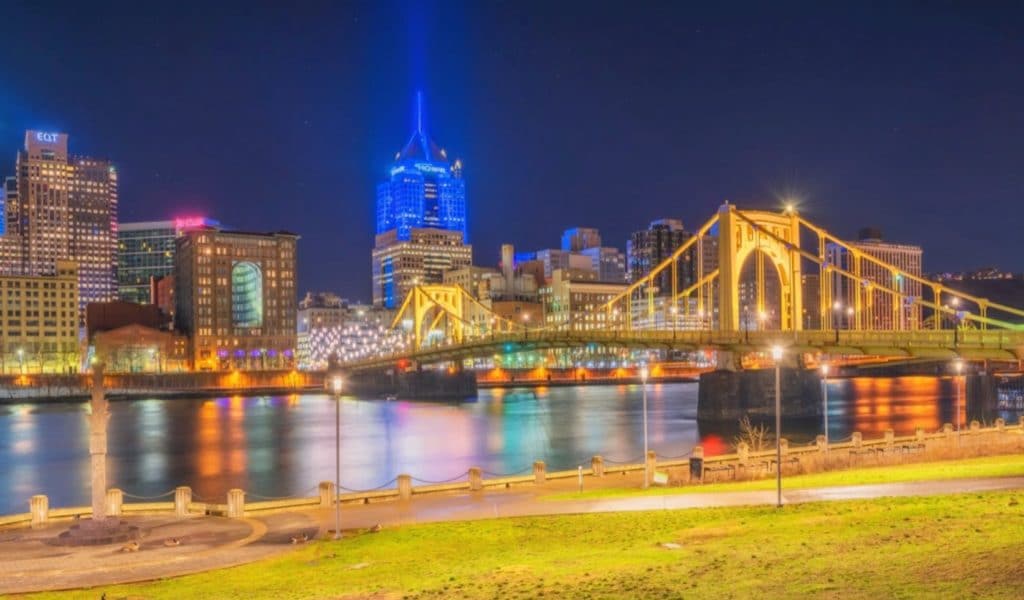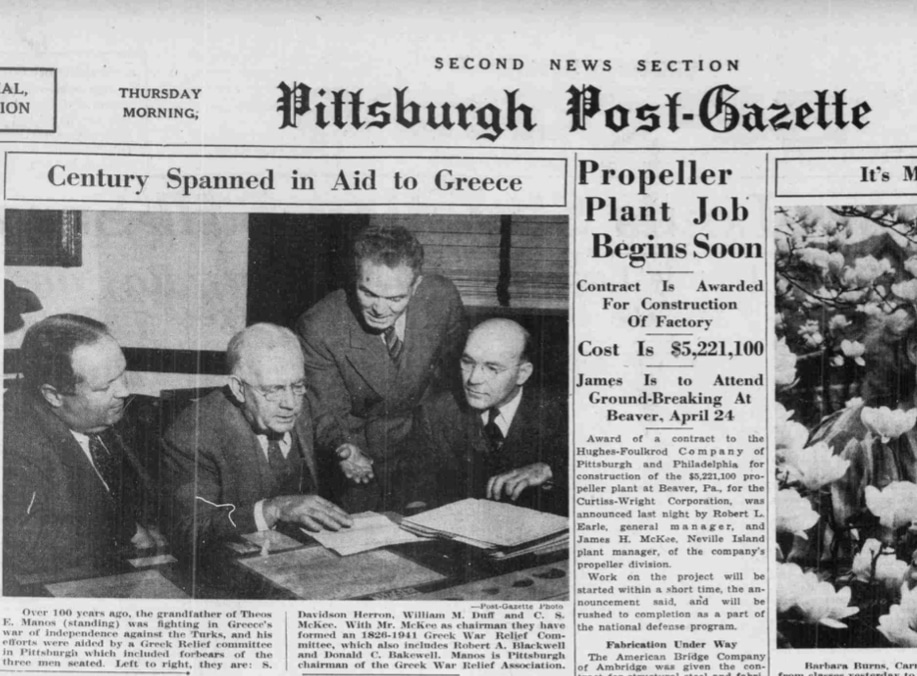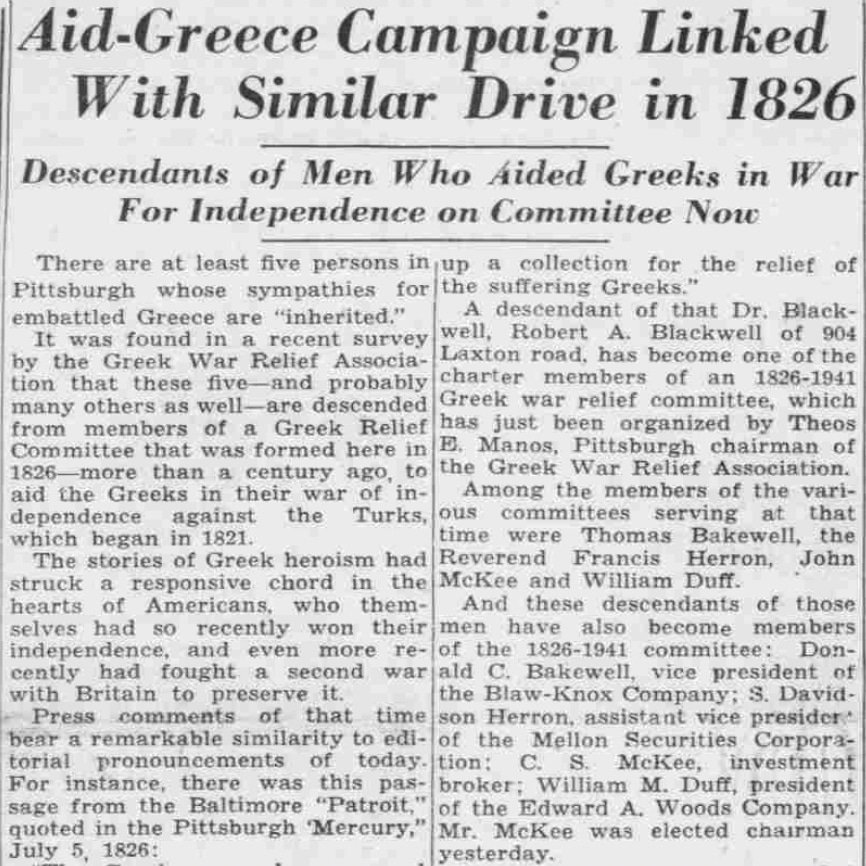
A historic discovery was made recently when a Greek immigrant who is a medical professor at the University of Pittsburgh in Pennsylvania happened upon a newspaper from 1941 which showed descendants of 1826 philhellenes stepping up to help Greece during WWII.
The photograph on the front page of the Pittsburgh Post-Gazette, under the sub headline “Century Spanned in Aid to Greece,” shows the descendants of the Pittsburgh War Relief Committee of 1826 banding together to collect assistance for Greece during WWII.
The newspaper discovered by Nick Giannoukakis, who is also the head of the American Hellenic Foundation of Western Pennsylvania (AHFWPA), related the incredible story of the descendants of the first Pittsburgh-area philhellenes who helped Greece assembling once again — just as their forefathers had — to aid the country in another time of great need.

Descendants follow Philhellenes legacy
The April 17, 1941, edition of the Post-Gazette showed the gathering of the descendants of renowned industrialists of Western Pennsylvania with a notable member of the Greek-American community at the time, Theos E. Manos.
As the organization was beginning to wrap up its year of commemorations of the Bicentennial of the Greek Revolution, Giannoukakis and his friends in the AHFWP were astonished to discover the photo and the story relating how these men had come together, as their forefathers had, to help a nation that they knew only from their schoolbooks and reports in newspapers.
This discovery was made quite serendipitously by Giannoukakis, who is not only the Chairperson of the AHFWP but the Chair of the Greek Nationality Room Committee of the Nationalities Room Program at the University of Pittsburgh as well.
He and his team were scouring Pennsylvania’s old regional newspapers for articles on Greek Americans of the area to include in the archives of the newly-dedicated “Digital Greek-American Cultural Center of Western Pennsylvania.”
The newspaper article tells the original story of a group of industrialists, professionals, and clergy in Western Pennsylvania banding together in 1826 to form a Greek Relief Committee to aid the Greek people in their War of Independence against the Turks.
According to the report, these individuals had been inspired to do so by the formation of Philadelphia’s own Greek Relief Committee earlier in the same year. Philadelphia, along with another main Revolutionary War city, Boston, was one of the major epicenters of American Philhellenes and Philhellenic activities.

American philhellenes deeply inspired by stories of Greek heroism in 1821
The Americans who formed these war relief committees were deeply inspired by the stories of Greek heroism and sacrifice in their struggle for liberty, perhaps especially since the American colonists had fought for their own liberty not too long before.
One such inspiration was provided inside the the July 5, 1826 edition of the Pittsburgh Mercury, which quoted an editorial from the Baltimore Patriot: “The Greeks….have proved themselves worthy of the liberty for which they are struggling, and if they are unsuccessful, it will not be for the want of stout hearts and great soul”.
In that same edition, a report on the massacre of the Greeks at Messolonghi was also related.
A public meeting was consequently held at the Pittsburgh courthouse on January 18th, 1827 and committees were appointed to solicit clothing, provisions, and funds for the Greek people. The Pittsburgh Mercury reported that a Reverend Dr. Blackwell offered a sermon and collected funds for Greek Relief at that meeting.
Greece, of course, went on to triumph over its Ottoman overlords, who had ruled the country for more than 400 years, obtaining its independence. But when, along with all other European nations who were victims of the Nazis, it found itself in peril again, a new generation of philhellenes stepped up once more to offer aid.

Descendants of the first Pittsburgh-area philhellenes stand up once more to lend aid
And incredibly, some of these people were the descendants of the very men who had provided help as part of the first Greek War Relief Committee formed more than a century earlier, in 1827. Among the “1826-1941 Greek Relief Committee” were the industrialists S. Davidson Herron, William M. Duff and C.S. McKee, Robert Blackwell and Donald C. Bakewell. Theodore Manos served as chairman of the committee.
Committee member Robert A. Blackwell was descended from original committee member Dr. Rev. Blackwell; Donald C. Bakewell, the descendant of 1826 committee member Thomas Bakewell, was the vice president of the Blaw- Knox Company, one of Western Pennsylvania’s largest foundries. Thomas Bakewell founded the famous Bakewell Glass Co in 1807, which was famous in its day for its beautiful cut and engraved glass which equaled the finest European glass.
S. Davidson Herron was the descendant of Committee member Rev. Francis Herron, while C.S. McKee, a well-known investment broker, was the descendant of Committee member John McKee.
William M. Duff, the president of the Edward A. Woods Company, a large insurance firm, was the descendant of Committee member William Duff.
Other 1826-1941 Greek War Relief Committee members
George Darsie, an organizer of the Western Pennsylvania Historical Society, was another Committee member and one of its first councilors. Later the director of the Ohio and Pennsylvania Railroad, he served as the company’s treasurer and the president of the Western Insurance Company.
Henry Holdship, a Committee member who was a Western Pennsylvania oil pioneer, was the son of successful paper manufacturer George W. Holdship.
Committee member John Snowden, who served as Mayor of Pittsburgh between 1825-1828, had been born to a Revolutionary War family himself. His father, John Snowden, was a hero of the war, being imprisoned by the British forces and dying in prison. His mother, Elizabeth Moor, was a major advisor to General Washington during his Pennsylvania campaigns. He eventually bought and edited his own newspaper, the Pittsburgh Mercury.
Committee member William Pentland was Pittsburgh City Treasurer in 1836 and 1837.
Fellow committee member William Eichbaum was a partner of the famous Cramer & Spear Bookbinding Company. He was also a key investor in the Point Steam Mill Cracker Bakery and also partnered with McHendry in the foundry industry.
Along with thousands of other Americans, they all came together to collect funds, clothing, and provisions for their fellow brothers and sisters in war-ravaged Greece.
AHFWP trying to identify other Committee members who came to Greece’s aid
The American Hellenic Foundation of Western Pennsylvania continues to identify the remaining known members of the Greek Relief Committee of 1826 — and to uncover as many others as they can.
On December 18, 2021, as part of its closing chapter of its celebration of the Bicentennial of the Greek Revolution, the Foundation, together with its partners, the Greek Nationality Room Committee at the University of Pittsburgh, and the European Art Center of Greece (EUARCE), will present these findings in a virtual event.
To be held on Friday, December 18, 2021 at 7 PM, it will be streamed live at this link.
The Foundation has also embarked on a project to reach out to their living descendants to inform them of their predecessors’ contribution to the liberation of Greece in the 1820’s, and to thank them for those contributions.
Related posts:
Views: 0
 RSS Feed
RSS Feed

















 December 4th, 2021
December 4th, 2021  Awake Goy
Awake Goy 
 Posted in
Posted in  Tags:
Tags: 
















